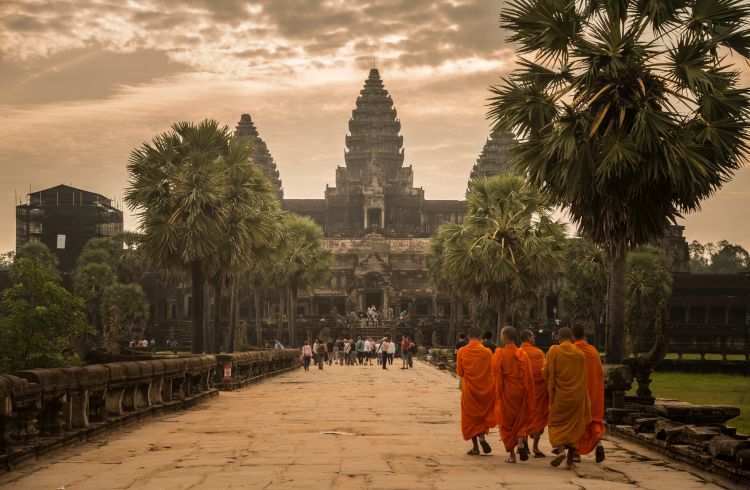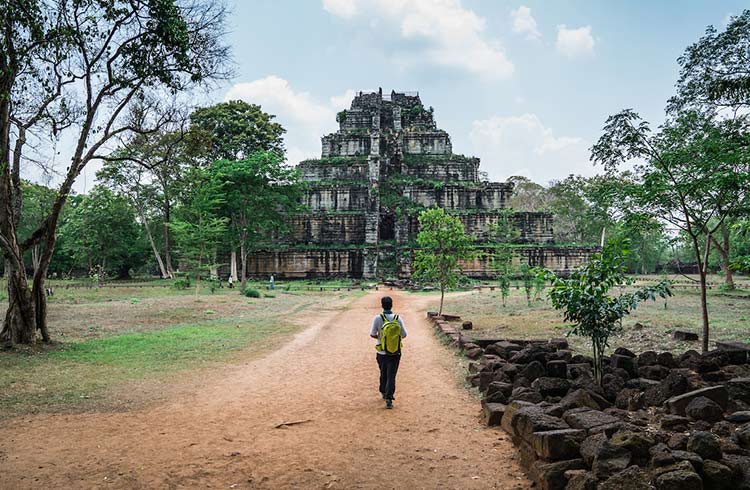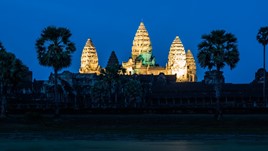Is Angkor Wat in Cambodia Safe? 8 Common Scams to Avoid
Watch out for dodgy tuk-tuk drivers, street vendors, fake guides and monks – don't fall for these common travel scams at Angkor Wat.
 Photo © Getty Images/Boy_Anupong
Photo © Getty Images/Boy_Anupong
Don't get taken for more than a tuk-tuk ride in Cambodia. Here are the scams to avoid while visiting Angkor Wat, Cambodia's most famous ancient temple.
The ancient city of Angkor Wat is on every visitor to Cambodia's itinerary. Although the crowds don’t take away from the wow factor, getting swindled while taking in the temples might. Watch out for these common cons.
- Tuk-tuk scams
- Bicycle hire scams
- Fake ticket agents
- Fake guides
- Fake monks
- Pushy vendors
- Child vendors
- Staying safe at Angkor Wat
1. Tuk-tuk scams
First on our list is the infamous tuk-tuk scam. It’s a long con that starts by catching you off-guard at the bus station or airport, where there are plenty of tuk-tuk drivers who will offer to take you to your hotel, sometimes even for free. Then, they offer a really good price to go to Angkor Wat (US $15 for the whole day including sunrise/sunset) and say that they will be there to pick you up first thing in the morning. At 4.30 am, there they are as promised, raring to go.
First, it’s off to the ticket office, about 3mi (5km) from the park entrance. You go in and pay for your ticket, and then, the trouble starts. As the sun rises, so does the price. it's no longer US $15 for the whole day, it’s US $30 per person or more. In your desperation to catch the sunrise, you’re forced to suck it up, and by the time you’ve haggled the price, you’ve missed the golden light and the tourist crowds have arrived.
Those who drive a hard bargain are likely to find that their tuk-tuk driver disappears, looking for higher-paying customers. If you get fed up with waiting - often an hour or two - and end up haggling another rate with a different driver, you can guarantee your original driver will show up at your accommodation later on, furious at you for ‘ditching’ him and demanding payment.
For the sake of saving a few bucks, the hassle is definitely not worth it. The best way to avoid any inconvenience is to book a tuk-tuk for the day through your accommodation. When you’re paying almost US $40 for the Angkor Pass, it’s worth ensuring the rest of the day goes smoothly. Do your research and make sure you know where you want to go so you can confirm this with the driver. Be aware that adding on any extra temples, especially those further afield, might cost a little extra.
Plan your day in advance, leave early in the morning, stick to the plan, and make sure you don’t pay in full until the end - or only pay half up front- and keep some spare change for a tip if everything does go well.
2. Bicycle hire scams
Hiring a bicycle is a great way to avoid the tuk-tuk drivers altogether and enjoy the freedom of the open road. However, some locals have been known to charge a fee for parking, and if anyone ever says you can park in front of their shop/restaurant/stall for free, then there’s probably going to be a catch. Wherever you end up parking, even if it ends up costing you a few thousand Riel, be sure to lock up your bike and remember where you parked!
It’s also worth downloading maps offline, pinning the temples you want to go to, and making sure your GPS works so you don’t get lost in the jungle. Bag snatches can happen, so don’t put your bag in the bicycle basket. Keep your valuables on your person and avoid cross-shoulder bags that can be easily grabbed.
3. Fake ticket agents
Once you have bought your Angkor Pass, you will go through several checkpoints to get it stamped and verified. The passes are valid for one, three or seven days, and cover all the temples in the Angkor complex, so you should not be charged any further entrance fees. On occasion, there are fake guards who will try to tell you that you have to pay extra to get into a temple.
Official Sokimex guards always wear blue shirts with a name badge and a lanyard with a photographed ID and will not ask you for money. They are there to double-check your pass and provide security at the site, but if you’re ever in doubt you can always ask to see their ID as well.
4. Fake guides
Becoming an official tour guide at Angkor Wat takes months of training, but anyone with a grasp of English and a keen mind can see this as a way to earn a few extra bucks- even a police officer in uniform! Be wary of anyone who approaches you asking if you need a guide, or offering to tell you some history for free, or even a tuk-tuk driver who also says that they are a guide or can give you some information, as they are all looking to turn a quick buck for their ‘knowledge’.
Sometimes, ignoring people and continuing on your way can be the only way to get rid of them. Headphones help, even if you’re not actually listening to anything. You can say you don’t have any money, but they will often continue to try to shake you down anyway. If you do decide you want to hire a guide, official guides all wear light yellow shirts and lanyards. If you haven’t organized one in advance, you should be able to strike a bargain with one, just be sure to ask to see credentials and confirm their knowledge before you agree on a price.
5. Fake monks
Another unexpected consequence of the increase in visitors to Angkor Wat is fake monks, who push incense into your hands, mumble some words and then try and charge you US$20 for the privilege. Although it a holy site, apparently they didn’t get the memo and see it as a good place for a scam as any.
The best way to avoid any awkwardness is just to politely decline.
6. Pushy vendors
Where there are tourists, there tend to be touts and overly aggressive salespeople clamoring for your attention, along with clusters of children forcing books, bracelets and over-priced bottles of water into your hands. Given the high amount of competition here, people will do or say anything for a sale, so it’s worth taking most things with a pinch of salt. And, as much as they might claim otherwise, there are food and water vendors inside the complex, so don’t feel pressured to buy anything at the front gate.
Expect to pay slightly more for food and drinks than you would outside the complex, but drive a hard bargain. Maps and guidebooks can be had for as little as US $1 in town before you go or inside the temples, but do your best to avoid buying from children at all costs; no matter how cute they are, as it reinforces a very harmful practice.
7. Child vendors
There are plenty of young kids at Angkor Wat who will run up to you and pull on your heartstrings, trying to get you to buy postcards or books, and saying they need money for school. No matter how persuasive they are, don’t buy into it. Unfortunately, they are being taken out of school and exploited as a way to provide income, either by their families or by others who are pocketing a sizeable chunk of the profits, if not all of it.
There are signs everywhere not to give money to beggars and children, and for good reason. Every dollar they make is another day they’re not in school, trying to line other people’s pockets and shake down the tourists the best they can.
8. Staying safe at Angkor Wat
Do your best not to flaunt valuables and put your camera away before you engage in bargaining. Keep an eye on your pockets if you are suddenly surrounded by a gang of kids as it's not unheard of for a wallet to suddenly disappear. Exercise normal caution, don’t carry around your passport, or excessive amounts of cash, and be as vigilant with your belongings as you can.
Related articles
Simple and flexible travel insurance
You can buy at home or while traveling, and claim online from anywhere in the world. With 150+ adventure activities covered and 24/7 emergency assistance.
Get a quote


No Comments